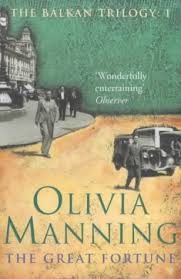The Great Fortune by Olivia Manning (Book Review)

My first introduction to Olivia Manning’s Fortunes of War cycle was the well-made TV series with Kenneth Branagh and Emma Thompson. Though I usually do not read a book if I have already seen the film adaptation of, I was glad I made the exception for The Great Fortune.[1] In the first book of the Balkan Trilogy, Manning introduces the reader to Guy and Harriet Pringle, a recently married couple who recently arrived in Bucharest as the Second World War is beginning. Guy works for the British Council and his official job is to teach English at the University of Bucharest. The Council’s actual objective, beyond English literacy, is to project Britain’s soft power with the goal of creating “a basis of friendly knowledge … which will lead to a sympathetic appreciation of British foreign policy”.[2] The Pringle’s inhabit a world of colourful characters. The British expats are a motley cohort of university professors, spies, and street smart foreign correspondents. Refugees are to be found everywhere in Bucharest. There are destitute Poles who have fled from the German invasion along with former German land owners who lost their estates after the Soviets occupied Bessarabia and Bukovina in June 1940.[3] The Romanian royalty is shown to be effete and debauched. The country is a dysfunctional and uncertain place. Carol II’s regime is corrupt, incompetent, and squalor is everywhere. In one amusing scene, reminiscent of Evelyn Waugh’s Scoop, Minister Ionescu gives a press conference in which he attempts to create a set of alternate facts around the assassination of Prime Minister Călinescu.
“And may we enquire who executed the assassins - no doubt without a trial?”
Ionescu grew grave again. He recited quickly: “The military, and with grief and indignation at the murder of a beloved Prime Minister, seized the young me and, unknown to the civil authorities, shot them out of hand.”
“Is that official?”
“Certainly.”
Someone asked: “Are you aware the bodies are being displayed at this moment down in the market-place? Do you approve of that sort of thing?”
Ionescu shrugged: “The military here is powerful. We dare not interfere.”
“I saw the bodies,” said Galpin. “They looked to me pretty old for students.”
“In this country we have students of all ages. Some remain at the university all their lives.”
As the drama of the war unfolds in the background, Harriet begins to question the basis of her relationship with Guy. She quickly becomes aware that any affection Guy displayed during their courtship will not be sustained. Though Guy is selfless, his generosity is applied equally to both his closest loved ones and strangers on the street. To each according to his need. Harriet craves a selfish and private love that is inimical to Guy’s nature as a man and his politics as a Communist. Like many true believers, Guy was undaunted by Stalin’s purges and has complete faith in Soviet foreign policy. Yet his political beliefs do not deter him from befriending wealthy Jewish bankers or ne’er do wells like Prince Yakimov, a White Russian who scrounges at every opportunity to finance his conspicuous consumption.
Guy’s natural warmth towards everyone could easily be misinterpreted. She had herself had taken it for granted that it was for her alone. They had slipped into marriage as though there could be no other possible resolution of such an encounter. Yet – supposing she had known him better? Supposing she had known him for a year and during that time observed him in all his other relationships? She would have hesitated, thinking the net of his affections too widely spread to hold the weighty accompaniment of marriage.
As Guy is always busy with his work or students, Harriet finds herself bored and restless. She is attracted, not necessarily in a romantic sense, to men like Clarence Lawson who also have a more selfish view of intimacy. However Harriet can sense in Clarence’s nihilism a dark force that needs to be avoided less she be dragged down to his level as well. The couple’s differences extend to the theological realm as well. Harriet is religious and Guy is an atheist who believes religion is designed to keep the poor poor and the rich rich. Because Guy cares about everyone, it feels as though he cares about no one in particular.
“Why be interested in people’s private lives? What they are pleased to let us know should be enough for us.”
“Well, I just am. You’re interested in ideas’ I in people. If you were more interested in people, you might not like them so much.”
Despite their difficulties the Pringle’s remain deeply attached to each other throughout the first book. It is difficult to imagine that Guy and Harriet could be a couple in peacetime England given their differences. But in a time of war, living in a city with only several dozen of your fellow countrymen, intimacy would seem to be an irresistible requirement of the human condition. Manning’s The Great Fortune is a brilliant book because it shows the impersonality of world events by putting a human drama at the centre of a story.
Footnotes
was prompted to pick up after seeing the film’s trailer in 2001. I wanted to make sure I read the book before the movie came out. Apparently I have had this philosophy for quite some time.
